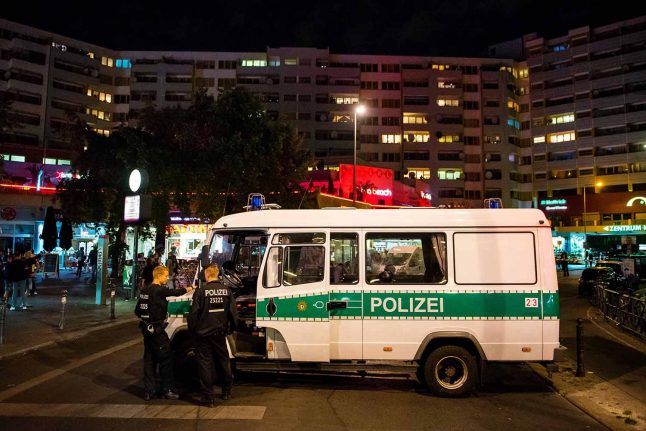At around 4:30am on Monday morning, a group of unidentified assailants smashed a hole in the wall of the bar in Oranienstraße, before placing and detonating an explosive device.
Although the bar itself was badly damaged, no-one was injured in the explosion.
The police’s Organized Crime Department has been assigned to follow up on the case. While Arabic gang activity has been on the rise across several German cities, it has been particularly prevalent in Berlin’s Kreuzberg district.
A series of apparent revenge attacks in recent months have resulted in concerns that the police are losing control of the streets.
In early September, a known gang figure named by police as ‘Nidal R’ was shot and killed in broad daylight by four assailants while walking through Templehofer Feld in the city’s neighbouring Neukölln district with his wife and children.
Over 100 people witnessed the shooting, which took place on a busy Sunday in the popular city park.
The murdered man had been warned by police just hours earlier that he may be in danger from rival gangs.
In the wake of the man’s funeral, police called for calm and threatened to significant repercussions for anyone planning to execute a revenge attack.
 Police guard Nidal R's funeral in Berlin's Schoeneberg district. Photo: DPA
Police guard Nidal R's funeral in Berlin's Schoeneberg district. Photo: DPA
Police believe a September attack on another Kreuzberg shisha bar, which followed shortly after the Templehof shooting, was related to Nidal R’s assassination.
In that attack, more than 30 assailants armed with batons descended on the Manteuffelstrasse bar, threatening customers and destroying furniture. By the time police arrived, the attackers – along with the customers and employees of the bar – had fled.
It follows two further attacks on establishments in Treptow and Kreuzberg during the months of September and October.
Despite the apparent increase in gang activity, local business owners have said they aren’t concerned by the escalating violence.
Julian Boyce, who owns Mexican restaurant Santa Maria – located just metres from where the explosion took place – said the gangs didn’t pose a threat to others in the neighbourhood.
“It’s something I’ve heard about, but we’ve never really come across any of it. I’ve always made it a priority to be friendly to our neighbours – we’re pretty friendly with everyone,” Boyce said.
“If you get mixed up in it then it could be a problem, but they (criminal gangs) tend to keep to themselves,” he added.
Neukolln mayor Martin Hikel has called for an end to the violence, telling a Berlin Internal Affairs Committee meeting that the “extreme brutality (of the gangs) endangers social peace”.
Hikel said that an estimated eight Arabic gangs made up of an approximate 1,000 people were active in his district.
p.p1 {margin: 0.0px 0.0px 0.0px 0.0px; font: 12.0px Helvetica}
p.p2 {margin: 0.0px 0.0px 0.0px 0.0px; font: 12.0px Helvetica; min-height: 14.0px}




 Please whitelist us to continue reading.
Please whitelist us to continue reading.
Aren’t you glad Angela let in a million “refugees”?
8 Arabic gangs well well who’d have thought it
Where is ” Mama Merkel ” and allowing all the peace loving Arabs into a lovel country like Germany, now all the peace loving people are destroying one of my favorite places to visit.